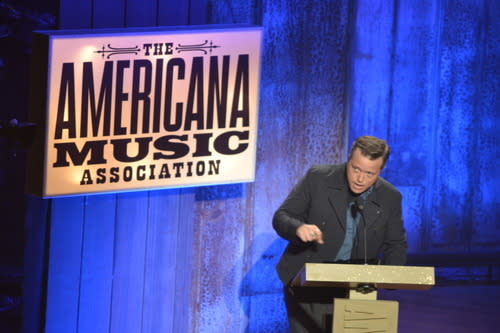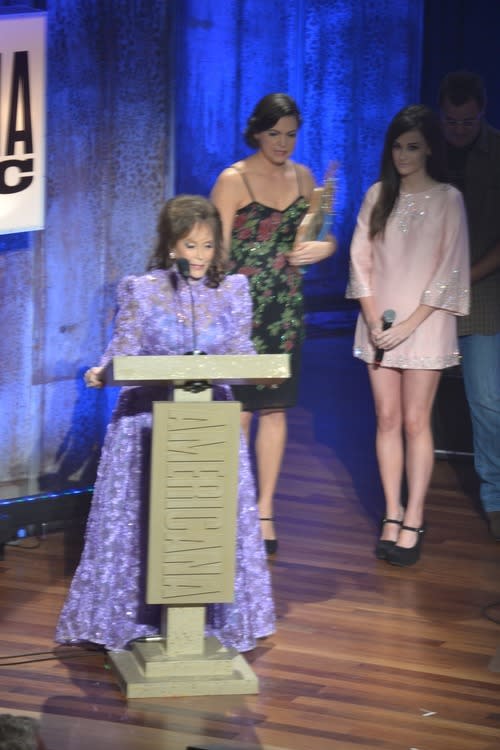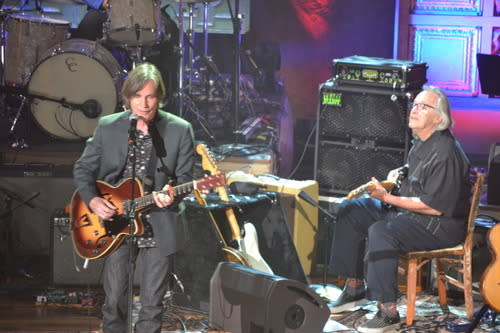Americana Awards Honor Loretta Lynn and Jackson Browne Alongside Fresh Faces Jason Isbell and Sturgill Simpson
It’s not very often that the Americana Music Awards result in anything that can be described as a “sweep,” since they only give out six awards total. (None of that stretching things out by breaking categories into “best male” and “female” for these progressive types.) So Jason Isbell came as close as humanly possible to a grand slam Wednesday night when he won all three prizes for which he could have contended: artist of the year, album of the year (Southeastern), and song of the year (“Cover Me Up”).
Now that he’s been unofficially crowned the King of Americana, Isbell must be feeling pretty good about his decision to leave the Drive-By Truckers right about now, if at any point he wasn’t in the seven years since his departure from that band left the Americana world rattled and shaken. He’s become such a universal favorite among fans of roots-oriented singer/songwriters that even Lucinda Williams, who presented Isbell his final award, had to break impartiality and signal her approval.
“I’m glad of this award,” Williams blurted after Isbell gave his acceptance speech. “His album is stupendous and beautiful!”

Accepting one of his three trophies, Isbell thanked Hank Williams, saying, “If it wasn’t for that guy, we would be holding this in an old, burned-out K-Mart out in Mufreesboro.” He also thanked his mother “for exposing me to Johns Prine and Hiatt when I was a little kid, so I had an idea what a song was supposed to be.
But the three-hour show at the Ryman — which will air in condensed form as an episode of Austin City Limits on Nov. 22 — wasn’t just about honoring fresh faces. The Americanas may be the only awards show that gives out almost as many lifetime achievement awards as they do trophies for contemporary work, and Wednesday’s show found all-timer plaudits being offered to Loretta Lynn, Jackson Browne, Flaco Jiminez, and Taj Mahal, all of whom performed with the house band following their acceptance speeches.
And what a house band. Leader Buddy Miller, the music director of TV’s Nashville, once again led the support group… even as he once again picked up an “instrumentalist of the year” trophy for his guitar work. This year, he had the legendary Ry Cooder sitting in (literally — Cooder prefers to take a seat) for nearly all the performances, along with other celebrated members like bassist Don Was and the McCrary Sisters. The only problem with the performance-heavy night was that everyone sounded so grand backed by Cooder and Miller, you knew it’d be disappointing to ever hear the original studio performances of those songs again. If only the Americana Music Association had rights to put out a live album culled from these awards-show performances each year. (Hint hint?)
The night kicked off with Loretta Lynn being welcomed by a lovably humbled and flustered Angaleena Presley and Kacey Musgraves, whose introductory remarks lasted about 10 times as long as the very thank-you that Lynn offered up, as country’s greatest female artist explained that she needed to get on a bus and get to a show 800 miles away as soon as she wrapped up her performance of “Coal Miner’s Daughter.” In the fascinating factoid department, Musgraves and Presley noted that Lynn had made her Grand Ole Opry debut on that same stage exactly 54 years ago that night.

Bluesman Taj Mahal is apparently not quite as accustomed to awards as Lynn, and his effusiveness knew few bounds as he accepted his lifetime achievement award from Keb Mo. “This is one of the most powerful and wonderful things that has ever happened in my life,” gushed Mahal.
Sturgill Simpson is definitely the man of the moment in Americana, at least besides Isbell. This purveyor of Waylon-style hard country was described by presented Elizabeth Cook as “the hero of outlaw country right now.” Whether she meant outlaw country the subgenre or Outlaw Country the XM Sirius channel on which she hosts a program, or both, wasn’t clear, but it’s true enough in either instance. Cook further enthused that, in his adventurous latest album, Simpson “took outlaw country, which is so important to me, and started singing about turtles and stuff.”

Simpson definitely lives up to the outlaw name by seeming as surly as he is proficient at recalling country classicism. Noting all the people who’d been behind his success, he said in his acceptance speech that “I could say all the names, but I’d be up here too long, so I’ll just thank my family.” Performing a set later Wednesday night at the City Winery, Simpson half-apologetically acknowledged that the room was “full of all the people I should have thanked an hour and a half ago” and admitted that he had come off at the awards show “like I don’t give a f—-,” though he’s only ever going to seem half-sorry for that at best.
Perhaps the truly most celebrated man at the Americana Awards and Honors was the late bluesman Willie Dixon, as he was the only songwriter to get covered twice in the performances – first, with host Jim Lauderdale’s opening “Can’t Judge a Book by Looking at Its Cover,” and later by jazz singer Cassandra Wilson doing a down-and-dirty take on “I Want to Be Loved,” as Cooder dug in on slide guitar.
If there were an award for audience favorite among the performers, it surely would have gone to St. Paul and the Broken Bones, whose R&B revivalism earned the only standing ovation of the night that had a 95 percent participation rate. The Civil Wars’ John Paul White even came out of post-breakup reclusion to introduce his fellow Birminghamians.
Other performance highlights included Valerie June, Rodney Crowell, Parker Milsap, The Devil Makes Three, Hooray for the Riff Raff, the Milk Carton Kids, Rosanne Cash, Sarah Jarosz, Hard Working Americans, and, as a duo, sweethearts Patty Griffin and Robert Plant.
Because of the reverence for traditionalism and sheer amount of acoustic guitars involved, Americana can sometimes get a rep for fogeyness, so it’s clear from the focus of the nominations and performance slots that the Americana Association wants to reward youthful practitioners of the genre as much as possible, those lifetime achievement trophies notwithstanding. Of course, what exactly constitutes the genre remains open for interpretations, and even lots of on-stage jokes. President Jed Hilly offered a special thanks to all the veteran members “who founded this organization 15 years ago and came up with the name ‘Americana’ as our lord and savior.”



